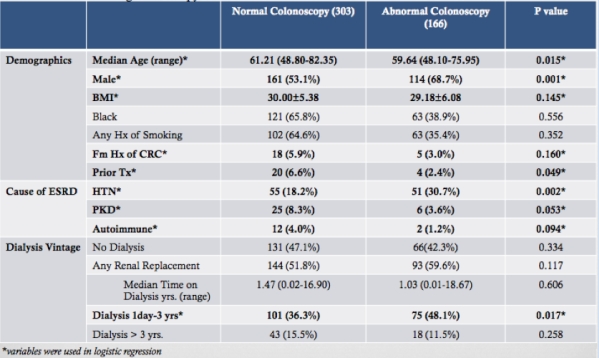The Effects of Dialysis Vintage and Hypertensive Renal Failure on Colonoscopy Findings During Kidney Transplant Evaluation
1School of Medicine, Case Western Reserve University, Cleveland, OH
2Department of Surgery, University Hospitals Case Medical Center, Cleveland, OH.
Meeting: 2015 American Transplant Congress
Abstract number: D229
Keywords: Kidney transplantation, Risk factors, Screening
Session Information
Session Name: Poster Session D: PTLD/Malignancies: All Topics
Session Type: Poster Session
Date: Tuesday, May 5, 2015
Session Time: 5:30pm-6:30pm
 Presentation Time: 5:30pm-6:30pm
Presentation Time: 5:30pm-6:30pm
Location: Exhibit Hall E
Colonoscopy as a screening modality starting at age 50 has recently undergone scrutiny due to concerns over the risks and benefits. We sought to identify factors affecting colonoscopy results amongst ESRD patients undergoing kidney transplant evaluation.
METHOD: We retrospectively studied 900 patients undergoing kidney transplant evaluation from 2009-2012. Patients age ≤ 48, previously diagnosed with colorectal cancer, and those without colonoscopies or pathology reports on record were excluded. Colonoscopy reports were categorized normal (no finding or hyperplastic polyp) or abnormal (adenomatous polyp or carcinoma).
RESULTS: 303 (64.6%) patients had normal colonoscopies and 166 (35.39%) had abnormal colonoscopies, with median age of 59 (48-76) and 61 (49-82) respectively. Chi-square analysis returned multiple variables with p≤0.20 that were then used for logistic regression analysis (figure 1). Regression showed males and increasing age were more likely to have abnormal findings (OR =1.97, [1.27-3.04], p=0.002) and (OR=1.05, [1.01-1.08], p=0.009) respectively. Similar results occurred for patients with dialysis vintage up to 3 years (OR=1.67, [1.10-2.54], p=0.016) or had hypertension as primary cause for renal failure (OR=2.15, [1.34-3.47], 0.002). Dialysis vintage > 3 years was not significantly different (OR=0.713 [0.40-1.29], 0.258), although sample size was small for this group (n= 61).
CONCLUSION: For patients undergoing kidney transplant evaluation, hypertensive renal failure and dialysis vintage up to 3 years may be risk factors for adenomatous findings on colonoscopies. Paradoxically, dialysis vintage of >3 years poses no significant risk for abnormal findings. As adenomatous polyp rates are high for patients undergoing kidney transplant evaluation, screening colonoscopies should be continued.

To cite this abstract in AMA style:
Zheng Y, Chaung K, Park P, Augustine J, Sarabu N, Schulak J, Sanchez E, Humphreville V, Ammori J, Woodside K. The Effects of Dialysis Vintage and Hypertensive Renal Failure on Colonoscopy Findings During Kidney Transplant Evaluation [abstract]. Am J Transplant. 2015; 15 (suppl 3). https://atcmeetingabstracts.com/abstract/the-effects-of-dialysis-vintage-and-hypertensive-renal-failure-on-colonoscopy-findings-during-kidney-transplant-evaluation/. Accessed March 4, 2026.« Back to 2015 American Transplant Congress
